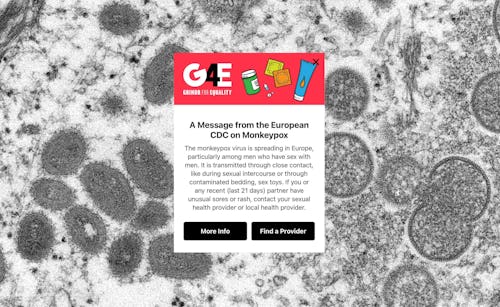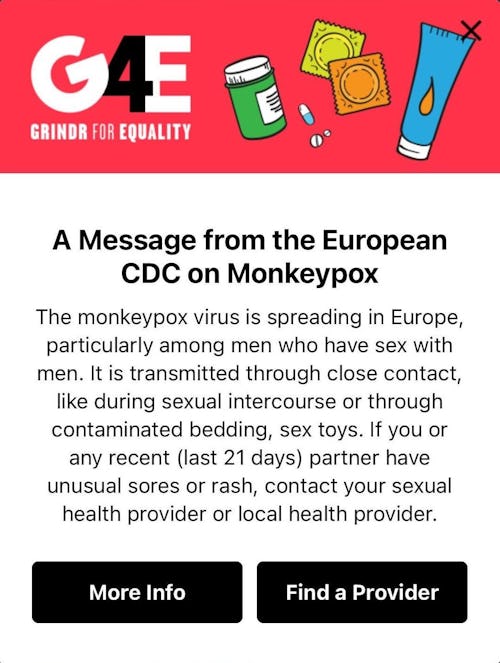
In the week since monkeypox started spreading through Europe, North America, and Australia, experts have been gathering more information about the outbreak’s origins. Unfortunately for the LGBTQ+ community, it’s not looking hot for us: Apparently, this outbreak can likely be traced to two gay raves in Spain and Belgium, per the AP. Grindr has even teamed up with health officials in the UK and started sending warnings to its users across Europe: “(Monkeypox) is transmitted through close contact, like during sexual intercourse or through contaminated bedding, sex toys,” the pop-up message reads.
I just know that some people are going to start using monkeypox as an excuse to sex-shame the queer community, like they did with HIV back in the day — but unlike the latter, monkeypox is not even a sexually transmitted disease. The virus spreads mostly by way of very close contact through “broken skin (even if not visible), respiratory tract, or the mucous membranes (eyes, nose or mouth),” according to the CDC. Because monkeypox isn’t nearly as easily spread as COVID, prolonged intimate contact is necessary for it to go from one person to the next, which means it is more likely — but not exclusively — spread during sex.
It just so happens that the current outbreak originated in queer communities, but that doesn’t mean queer people are to blame. “By nature, sexual activity involves intimate contact, which one would expect to increase the likelihood of transmission, whatever a person’s sexual orientation and irrespective of the mode of transmission,” Mike Skinner, a virologist at Imperial College London, told the AP.

Earlier this week, World Health Organization (WHO) advisor Andy Seale also stressed that, “while we are seeing some cases among men who have sex with men, this is not a gay disease.”
Ultimately, the danger when discussing this monkeypox outbreak and its origins, as the queer publication them pointed out, is that stigmatizing the virus by associating it with the LGBTQ+ community will only deter people from getting tested. “Stigma and blame undermine trust and capacity to respond effectively during outbreaks like this one,” UNAIDS deputy executive director Matthew Kavanagh said in a statement.
So far, there has only been one confirmed case and a handful presumptive cases in the U.S., but there are dozens more across Europe and Australia. Symptoms of monkeypox include fever, chills, and smallpox-like lesions, and the CDC recently issued a travel alert warning us to stay away from sick people with skin or genital lesions. Luckily, monkeypox isn’t usually deadly and the government is starting to offer vaccines to healthcare workers and people who are exposed to the virus, per CNN.
This week, the United Nations warned against racist and homophobic coverage of the monkeypox that mostly portrays it as an illness suffered by Black African people (Exhibit A) and LGBTQ+ people. Anyone can get monkeypox, and it’s time we start acting like it.







